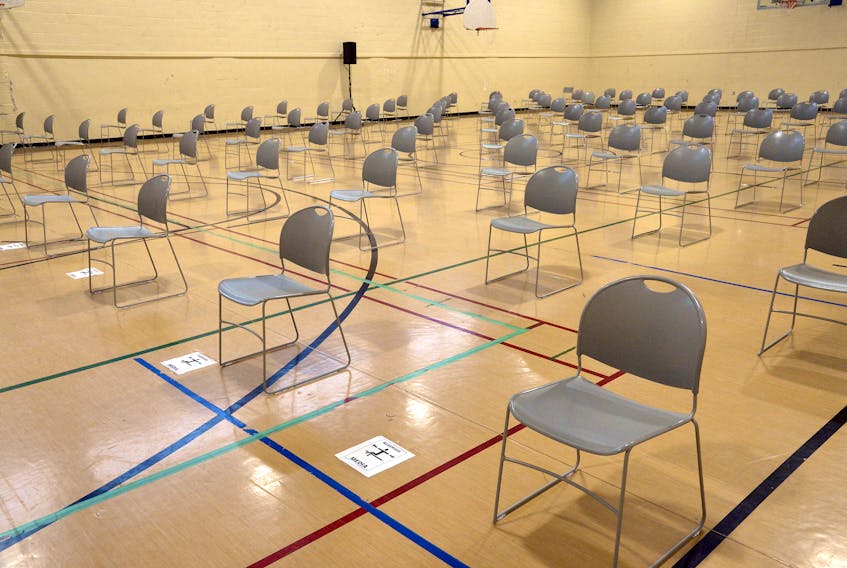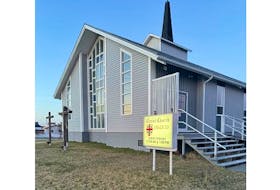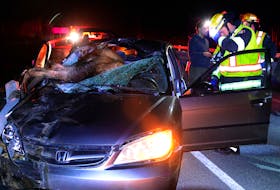ST. JOHN'S, N.L. — When jury selection begins Monday for the case of RNC Const. Doug Snelgrove, it will mark his second time going to trial for sexual assault. It will also mark only the second jury trial to take place in Canada since the start of the COVID-19 pandemic last spring.
Snelgrove, 42, had been scheduled to be retried at the end of March, but his was one of four jury trials in the province — and dozens across the country — that was postponed indefinitely as courts figured out the logistics of proceeding with the matters while abiding by public-health directives in light of the coronavirus outbreak.
Snelgrove is accused of sexually assaulting a woman in St. John’s in December 2014 while he was on duty. Between 150 and 200 potential jurors are expected to participate in the selection process for his retrial, which was ordered by the Supreme Court of Canada after appeals.
Courts in every province reduced operations and halted jury trials during the pandemic as they looked for alternate venues with the capacity to seat participants while maintaining social distancing.
The first jury selection process to proceed amid the pandemic took place last month in New Brunswick for the case of Matthew Raymond, who is charged with shooting and killing two civilians and two police officers in Fredericton two years ago. Instead of the courthouse, jurors filed into the Fredericton Convention Centre, where they participated in a COVID-19 screening questionnaire, wore face masks, applied hand sanitizer and sat in chairs six feet apart.
The process will be similar Monday as Snelgrove’s jury selection gets underway in St. John’s at the School for the Deaf on Topsail Road. Sheriff’s officers and court staff were at the school Friday, setting up an off-site courtroom connected by audio/visual equipment to a public gallery in the gym and preparing classrooms to serve as holding rooms for potential jurors.
“Obviously the way that we will go through the jury trial will be somewhat the same, but somewhat different,” Newfoundland and Labrador Supreme Court Chief Justice Raymond Whalen told The Telegram. “The protocols dealing with seating and physical distancing and the co-ordination of the people coming into the building and leaving the building and participating in the jury — all that’s being done in a much more strict environment, managed by and overseen by sheriff’s officers. There are very tight protocols that have to be followed.”
Everyone summoned for jury duty received an information package with details on the new process and information related to COVID-19. As with regular jury selection, the potential jurors were given the opportunity to apply for an exemption in advance. The judge presiding over Snelgrove’s trial will hear exemption requests in person on Monday from those who did not meet the preliminary criteria to be dismissed.
That’s when Whalen predicts the issue of COVID-19 will come up.
“That’s where I think some people will probably raise the issue of fear around COVID-19 or want to claim exemption on the basis that it may cause them undue hardship in some fashion, and we’ll deal with issues like that,” he said. “Basically the judge who is presiding will have to listen to the concern of the individual and the circumstances they are describing. If it meets the threshold of actually being a serious hardship to them, they could be exempted. If it doesn’t, then they won’t be exempted. It’s an issue that courts are facing all across the country.”
It will also be up to the judge to decide how to proceed if a juror becomes ill or contracts COVID-19 during the trial, Whalen explained. It’s an issue with no set protocol.
“There is no answer to that question, to be quite frank. It’s similar to what’s happening in schools,” Whalen said. “We’re all learning somewhat as the circumstances are evolving.”
While members of the media have had access to court proceedings throughout the pandemic — either in person or by phone — the public has been restricted from attending the courthouse until recently, due to social distancing limits. At the former School for the Deaf, up to 100 members of the public will be able to attend the proceedings.
The site was selected as the appropriate venue with the help of the provincial departments of Justice and Public Safety and Transporation and Infrastructure.
“This building is owned by government and existing furniture is being used and Eastern Audio was engaged to implement technical resources,” Justice Minister Steve Crocker said in an emailed statement to The Telegram. “The final costs have not been determined, but are anticipated to be minimal. Every effort was made to use existing resources and utilize government assets.
“I am confident all stakeholders realize the importance of access to justice and are working to address delays created by this unprecedented situation.”
Over the three months Supreme Court was on lockdown and hearing urgent matters only, more than 1,000 court appearances were postponed. Whalen predicts that backlog to be cleared by the end of October, with the exception of the postponed jury trials and some judge-alone criminal trials needing a month or more of court time. Those have been rescheduled for the fall and into 2021.
The ability to proceed with cases virtually, though there were challenges with getting all parties on board, helped minimize the impact of the lockdown.
“Everything was paused, but we did ramp up, like a lot of institutions, and found ways of opening in pieces by July 2,” Whalen said. “We worked through the summer to the extent that we could and we covered much of the work that was missed between March and June.
“Everything has been taken case of. There’s nothing still loose or not been addressed yet.”
Supreme Court increased its regular capacity to hold virtual hearings by expanding its audio/video platform to connect not only courtrooms across the province, but to allow parties the ability to participate in court proceedings from their office or home. The expansion was a success, Whalen said, and he expects it to continue after the pandemic.
Snelgrove’s trial, once the jury is selected and it gets underway, is scheduled to last 10 days.
Snelgrove, who has been suspended without pay since police received the report he had sexually assaulted a 21-year-old woman, pleaded not guilty to the charge and said the sexual contact had been consensual. His acquittal sparked public outrage and protests at RNC headquarters in St. John’s, as well as at the courthouse.
The Crown appealed the verdict on the grounds the trial judge had erred in instructing the jury. Two of three appeal court judges agreed the appeal should be allowed, paving the way for a new trial. Snelgrove appealed his case to the Supreme Court of Canada, which ordered a new trial.
An RNC public complaints process will not be completed until Snelgrove’s court case is completed, as is protocol. That means he is still employed by the constabulary, though he is not working.
Shortly after he was suspended, Snelgrove asked then-chief Bill Janes to reinstate him, but Janes refused. Once he was acquitted, Snelgrove asked chief Joe Boland to overturn his suspension, but Boland also refused. Snelgrove then turned to the court, asking for a judicial review of the two chiefs’ decisions. While the judge determined Janes’ reasons for suspending Snelgrove had been unreasonable, he found Boland’s reasons were acceptable and dismissed Snelgrove’s bid to be reinstated.









